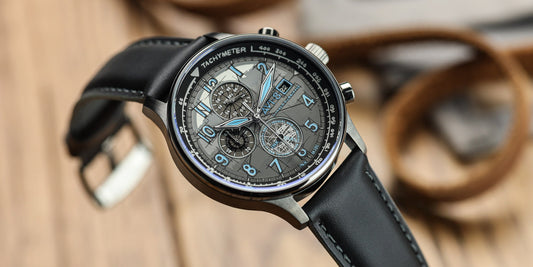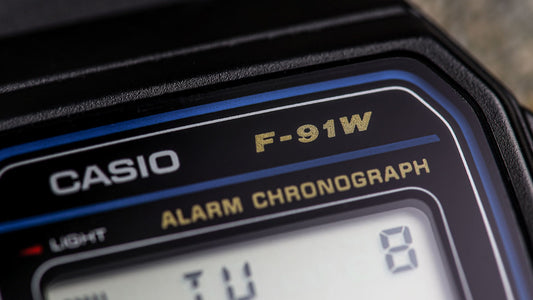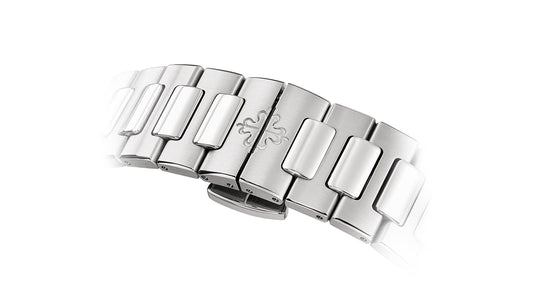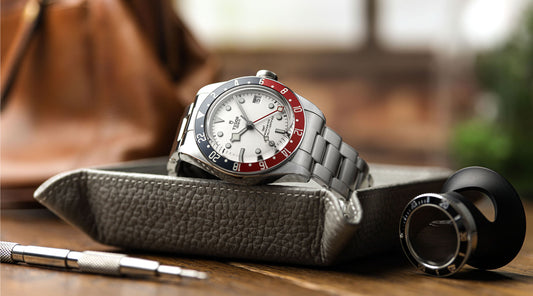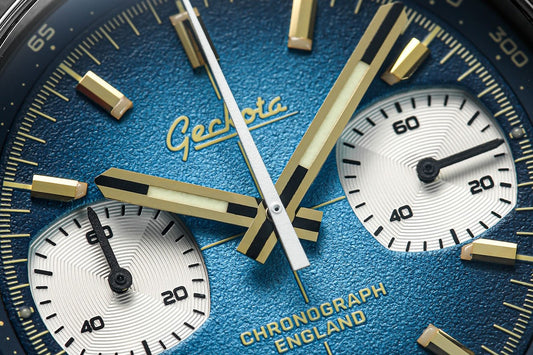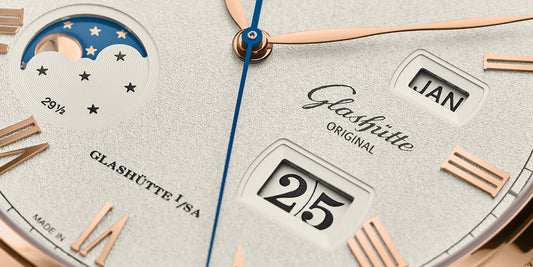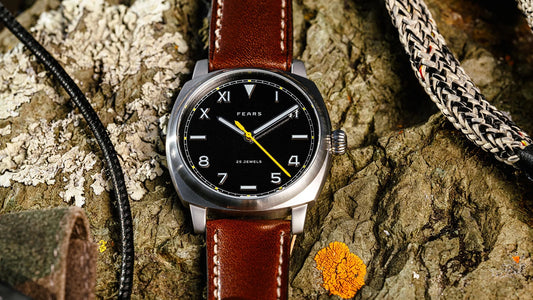Want to know more about Steve McQueen & Le Mans? From the Porsche 917, to the Le Mans race and the now-iconic Heuer Monaco chronograph – Read more here…
Le Mans (1971) is one of the classic motor racing movies. Read on to explore this motor-sport gem and the fascinating story behind it. Here’s how to appreciate Steve McQueen & Le Mans…
‘Racing is life,’ says racer Michael Delaney. ‘Everything that happens before or after is just waiting.’ Then the flag drops and, intercutting footage from Le Mans 1970 with sequences filmed later on the 13.6 Km (8.4-mile) Circuit de la Sarthe, Porsche’s 917s accelerate away in an explosion of sound and movement…

Steve McQueen has always had great taste in cars... - Image Credit: Wikimedia Commons [product ids="5114,5707, 5514"]
First, get Le Mans DVDs

Steve McQueen The Man & Le Mans DVD - Image Credit: WatchGecko Online Magazine
Starting with the movie itself, do yourself a favour and buy a copy. Get 2015’s documentary, Steve McQueen: The Man & Le Mans too. It’s a fascinating decades-on perspective on McQueen’s vision for the ultimate car-racing movie – and its troubled production.
Le Mans unarguably delivers a remarkably authentic depiction of the Le Mans experience, albeit with minimal plot beyond the racing. However, to criticise the movie for this may miss a point – paraphrasing McQueen: the race is the story; not much else matters.
Critical reception
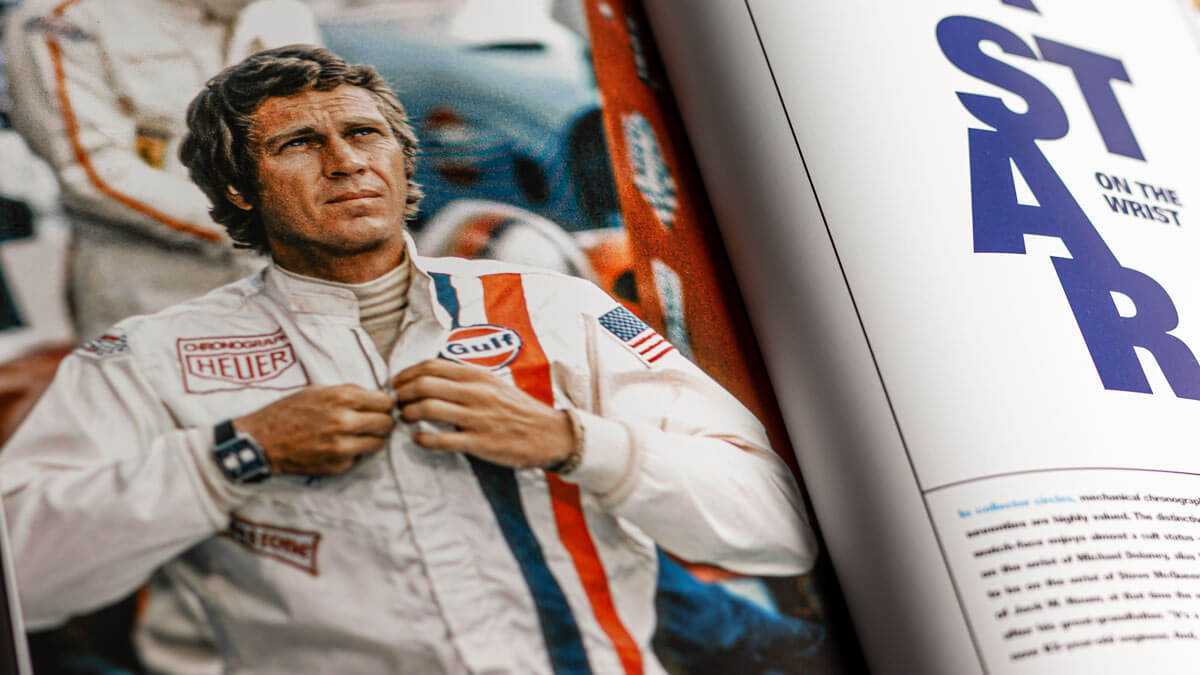
Steve McQueen - Image Credit: WatchGecko Online Magazine
Certainly, the Lee H Katzin-directed production (Katzin succeeded original director, John Sturges) has been criticised for lacking identity, uncertain objectives and minimal character development. Again, that may be to misunderstand McQueen’s ambition. In Le Mans, it’s the cars – armadas of thundering Porsches, Ferraris, Matras, Chevrons and GT also-rans – that star throughout the movie’s 106 breathtaking minutes.

The McKennas in the pits - Image Credit: WatchGecko Online Magazine
Andy McKenna, former racing driver and father of Geckota brand ambassador, GT racer Scott McKenna, says: ‘When I first saw the movie, it was all about the cars. However, with time, and despite what some critics said when it was released, I’ve come to appreciate it for so much more.’
Arguably, three of the biggest motor-racing movies of the time were John Frankenheimer’s Grand Prix, Claude Lelouch’s A Man and a Woman (Un homme et une femme) and Le Mans. The last two feature Le Mans, but McQueen’s movie is very different from the Palme d’Or-winning love story set against France’s mid-1960s racing scene.
Frankenheimer’s award-winner successfully blends racing with off-track romance – but lacks technically with thinly-disguised F3 cars and a paucity of ‘driver-actors’ beyond, perhaps, James Garner.
Le Mans is all about the racing and cars
In Le Mans, despite directorial desires to mix racing and romance, and an interesting soundtrack, we only get hints about characters’ stories, interactions or possible romantic involvement. Dig deeper into making Le Mans and discover how lack of plot was so contentious – and how casting little-known actors such as Siegfried Rauch and Elga Anderson minimised distraction from cars and racing. It’s the same with dialogue. McQueen clearly saw human voices playing only a distant second-string to the 12-cylinder howl of Zuffenhausen and Maranello’s engines.

Steve McQueen Le Mans DVD - Image Credit: WatchGecko Online Magazine
Whether McQueen’s Woodstock with race cars was fully achieved is questionable. However, though character development, dramatic storytelling and real plot are lacking, Le Mans successfully captures the zeitgeist of 1970s sports car racing.
Plot may be sparse, but Le Mans has moments of genuine poignancy. As racers, Andy and Scott McKenna relate directly to the early scene where McQueen’s Delaney stops his Porsche 911 at Maison Blanche and reflects on the previous year’s fatal accident involving fellow racer Piero Belgetti. ‘There’s something about that scene – the tranquillity, the violent energy of the flashback, then more tranquillity – that Scott and I relate to when we visit famous circuits and share their history.’
McQueen was a capable sports car racer

Not your normal Porsche... - Image Credit: WatchGecko Online Magazine
As well as an acting great, McQueen was a capable racer who, with Peter Revson, finished second at Sebring in his Porsche 908/2 just before filming Le Mans. His original plan was to contend Le Mans with Britain’s Jackie Stewart. When insurers stymied that, Jonathan Williams and Herbert Linge drove McQueen’s 908 as an in-race camera car to gain the footage that makes Le Mans so authentic. Later, during months’ filming on the circuit, McQueen drove Porsche 917s at racing speeds amongst professionals such as Derek Bell and Jo Siffert. Investigate the film’s production and discover how, on one occasion, even his young son Chad steered the mighty 917…
Steve McQueen: The Man & Le Mans

Must watch Steve McQueen DVDs - Image Credit: WatchGecko Online Magazine [product ids="5114,5707, 5514"]
Keyser’s respected book examines McQueen’s early career. It then describes his racing leading up to Le Mans, the main marques featured in the film, 1970’s Le Mans 24 Hours and, of course, the filmmaking.

A French Kiss with Death: Steve McQueen - Image Credit: WatchGecko Online Magazine
For further insights, get Steve McQueen: Le Mans in the Rearview Mirror by Don Nunley with Marshall Terrill. In the words of its author – prop-master on Le Mans – writing 45 years after filming, the book’s about ‘revisiting, reliving and delving into a movie that was a critical failure and box-office disappointment at the time of its release – and a miserable experience for everyone involved, to boot (most especially its star, Steve McQueen, who called it “a bloodbath”). Given Nunley’s role, expect detailed first-hand insights into Steve McQueen’s Heuer Monaco watch – a story Nunley also tells in Chris Malburg’s Quill & Pad article.
Steve McQueen and Siegfried Rauch

Our Le Mans: The Movie – The Friendship – The Facts - Image Credit: WatchGecko Online Magazine
For a third perspective, Hans Hamer’s Our Le Mans: The Movie – The Friendship – The Facts documents the friendship between McQueen and actor Siegfried ‘Sigi’ Rauch (Ferrari’s Erich Stahler in Le Mans). The book also covers the Le Mans 1970 race, gains perspectives from drivers and others involved, and profiles Porsche’s 917 and Ferrari’s 512.
It also describes the moviemaking in detail and addresses Le Mans’ heritage 45 years on – including the fate of McQueen’s road-going Porsche 911S and that Heuer Monaco watch.
Last, but not least, Sandro Garbo’s 2016 graphic novel, Steve McQueen in Le Mans, also deserves mention for its exquisite interpretation of the movie.
The Steve McQueen Heuer Monaco

The Steve McQueen Heuer Monaco - Image Credit: WatchGecko Online Magazine
There are various versions of how McQueen came to wear the Monaco. What’s consistent is that it was associated with Porsche driver Jo ‘Seppi’ Siffert’s role as McQueen’s mentor. Siffert, who famously wore Heuer’s Autavia, reputedly gave McQueen one of his Heuer-emblazoned racing suits when the American wanted to look like the Swiss racer. Read the books, Nunley’s Quill & Pad interview and Jack Heuer’s autobiography The Times of My Life for subtly-different perspectives.
Le Mans: one of the best-loved racing movies

A more obtainable version of the 917K! - Image Credit: WatchGecko Online Magazine
At the time of writing, the fiftieth anniversary of Le Mans approaches. Undoubtedly, production was challenging and hugely transformative for McQueen. Gaining mixed reviews on release, it wasn’t a box-office success. Yet, time shows it’s one of the best-loved and most authentic racing movies ever.
Andy McKenna again: ‘I rate Le Mans alongside Grand Prix as one of my favourite racing films. A big difference is the variation in the actors’ driving ability, with only James Garner coming close to professional driving skills in Frankenheimer’s movie. Compare that to the many professional drivers in Le Mans and how several of its cast were judged capable of driving the race cars during filming. The difference is noticeable.’
During 2019’s Le Mans race, commentators mused that for its survival it must embrace electric technology. What a contrast with the no-hydrocarbons-spared 1970s that Le Mans depicts so evocatively. And what a joyous celebration of Le Mans history it is as it captures the unique atmosphere of the French classic – if not quite as well as Steve McQueen hoped…
Visit Le Mans in Steve McQueen’s tyre tracks
Le Mans is a must-visit destination for serious endurance racing fans. Even if you’re only passing through, put on Michel Legrand’s soundtrack and drive the circuit’s public-road sections (approximately three-quarters of its length).
The Musée des 24 Heures du Mans

The Musée des 24 Heures du Mans - Image Credit: WatchGecko Online Magazine
Lots has changed since 1970, but the basic circuit remains and you’ll recognise key locations down the Ligne Droite des Hunaudières, through Mulsanne, Indianapolis and Arnage, and on to where 1971’s Porsche Curves leave the D139 – just beyond where Delaney’s 917 (actually a Porsche-bodied Lola) crashes. Then continue north and, before reaching the Automobile Club de l'Ouest’s must-visit Musée des 24 Heures du Mans, negotiate Maison Blanche's fabled kink that 1970's racers took at over 180 mph (290 kph)…
What Le Mans says, it means

The Musée des 24 Heures du Mans - Image Credit: WatchGecko Online Magazine [product ids="5114,5707, 5514"]
So load that DVD, immerse yourself in Le Mans’ visceral emotion and decide for yourself. Hear that famous heartbeat, look into McQueen’s ice-blue eyes, watch the famous Dutray clock strike four and watch Michael Delaney and Gulf Porsche '20' start the race of their life…





